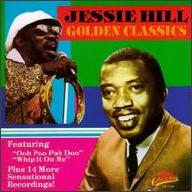The origins of Ooh Poo Pah Doo reportedly lie with a local pianist known only as Big Four. A drunk who played the club Shy Guy's Place for booze and tips, he once performed the song with the House Rockers in attendance, and Hill scribbled the lyrics and melody on a paper sack, later fleshing it all out with an intro cribbed from Dave Bartholomew. Its dubious evolution notwithstanding, Ooh Poo Pah Doo remains one of the classics of New Orleans RB. A nonsensical yet rollicking call-and-response workout that perfectly captures the energy of French Quarter life, it was honed to a fine edge on-stage before Hill cut a demo that he shopped to local labels, among them Joe Ruffino's Ric and Ron imprints. Ruffino passed, but recommended Hill pitch Joe Banashak's Minit, which agreed to book session time at Cosimo Matassa's Cosimo's Studio. The resulting date would prove the first production credit notched by the great Allen Toussaint, and upon its early 1960 release, Ooh Poo Pah Doo first emerged as a favorite at Mardi Gras. Eventually, the single broke nationally, selling 800,000 copies on its way to cracking the Billboard RB Top Five and the pop Top 30. Hill took the House Rockers on a national tour that culminated with an appearance at New York City's legendary Apollo Theater, but his accounting practices so angered the other members of the band that it dissolved prior to a performance in Washington, D.C.
After returning to New Orleans, Hill re-entered the studio to cut Whip It on Me, which briefly entered the Billboard Hot 100 before disappearing from sight. The follow-up, Scoop Scoobie Doobie, was a massive local hit but failed to catch on nationally. Subsequent Minit efforts including I Got Mine and Oogsey Moo made little impact, and after a last stab to recapture his initial success with I Can't Get Enough of That Ooh Poo Pah Doo, Hill left the label in 1962. In an effort to reignite his career he moved to California. There he befriended fellow bayou expatriates Harold Battiste, Dave Dixon, and Mac Rebennack (the future Dr. John), who convinced him to temporarily sideline his performing career in favor of songwriting. In the years to follow everyone from Ike Tina Turner to Sonny Cher recorded Hill's songs, and he even wrote with Willie Nelson. In 1972, he signed to the Blue Thumb label to cut a solo LP, Naturally, an ambitious but deeply flawed effort that sold scant few copies. Despite his success on the West Coast, Hill nevertheless suffered financial difficulties exacerbated by his growing drinking problem. After a disagreement with Battiste he quit his staff songwriting gig, and while serving a stint in Los Angeles County Jail for an accumulation of traffic warrants, his car, which contained all of his songwriting material, was stolen.
Hill ultimately returned to New Orleans in 1977, but after coming home he found little in the way of either live dates or songwriting work, and for a time he drove his own taxi, a black Cadillac dubbed "The Poo Cab." As his drinking and narcotics use escalated, however, he racked up a series of DWI infractions, and in short order lost his license altogether. His occasional live appearances were typically train wrecks, hastily assembled affairs performed with pickup bands, and for a time Hill was homeless. Several benefit gigs were held in his honor, but did little to revive his personal or professional fortunes. Hill finally succumbed to heart and kidney failure on September 17, 1996, and his body was laid to rest under a plywood grave marker in New Orleans' Holt Cemetery. ~ Jason Ankeny, Rovi













